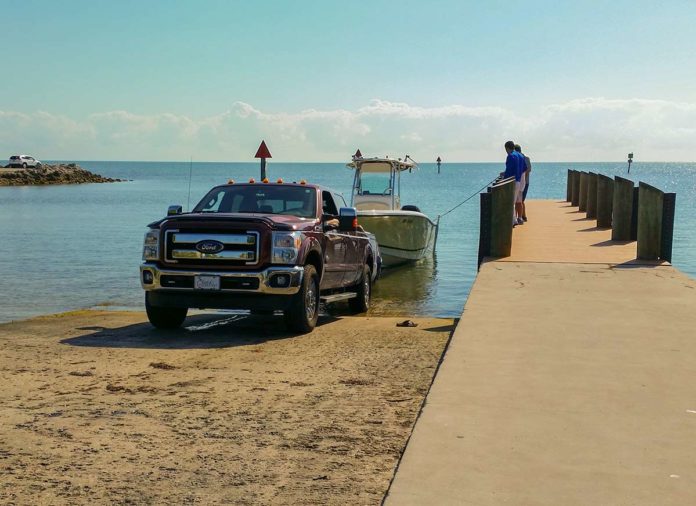
With Memorial Day in the rearview mirror, we’re officially into the sweltering days of summer in the Keys. The season will see residents and visitors alike flock to public boat ramps for their chance to beat the heat – with plenty of new captains still learning the ins and outs of their vessels. The National Marine Manufacturers’ Association announced that new boat sales reached a 13-year high in 2020 and remained elevated in 2021, with sales through March 2021 up 30% compared to the 2020 average.
Keys boat ramps have taken center stage during several government meetings, and I’m sure most reading this article have seen at least one – OK, maybe 100 – angry social media rants about conduct at popular launch sites. The concern is justified; a visit to Marathon’s Quay boat ramp on a Saturday typically finds a line of trailers backed all the way out to U.S. 1, and R.I.P. to the brave souls who try to launch during the hellscape of mini-season.
When captains fail to follow the unwritten – yet somehow ironclad – laws of boat ramp conduct, the problem becomes 10 times worse. In the spirit of heading off summer boat ramp shouting matches, I’m glad to offer what I’ve learned in the 17 years since my parents made the mistake of kick-starting my nautical obsessions with my first rowboat.
Let me be clear: I’m no boating saint. I’m a proud member of the unspeakable heathens of the boating community: jet skiers. And though the group rightfully earns its reputation in many cases, there are plenty of riders who know, and follow, rules of common courtesy.
How did I learn those rules? Well, my copy of “The Complete Idiot’s Guide to Boating and Sailing” is the most worn, dog-eared volume sitting on my shelf, and has been for years. The Qualified Captain’s Instagram account (@thequalifiedcaptain) is a fantastic collection of videos that vividly illustrate the consequences of captains’ poor choices. And my learning was *greatly* accelerated when my own breaches of ramp etiquette were met with an impressive tapestry of obscenities from fellow boaters.
But to save the rest of you from that lovely experience, just read the few paragraphs here. Maybe it’ll help.
It’s better with a friend.
Sure, every captain wants to be the master of both boat and towing vehicle, but so many boat ramp problems can be alleviated with a boat and car driver working together. Call that buddy of yours who likes to remind everyone that “having a friend with a boat is better than having a boat” and tell him it’s time to learn and pull his weight. While one drives the car, the other can quickly back the boat off the trailer, and when it’s time to head home, one of the two can keep the waiting boat out of the way while the other handles the line of trailers at the ramp. Which leads me to…
Taking your turn: it’s about cars, not boats.
The order of launching and retrieving vessels at a boat ramp is determined by the line of cars on land, NOT the order in which boats arrived at the ramp. A boat sitting near the ramp without a trailer prepared to haul it away is nothing more than a giant roadblock. Keep well away from the ramp and the attached courtesy dock until it is your turn to actively launch or retrieve your boat. If you’re retrieving your boat alone, make sure that once you tie your boat to the dock, you can quickly and efficiently get to your car and get it down the ramp.
Launch prep: if it’s your turn, you’re too late.
Most days on the boat require a good bit of gear to enjoy properly. A cooler full of cold ones, tackle boxes, floats, you name it. However, the time to “load up” is NOT when your boat is halfway down the ramp and nearly touching the water. Once you pull into the parking lot of the ramp, take some time to pull to the side, put all necessary gear in the boat, prep any dock lines you might need, and release those pesky transom straps. Make sure your boat’s key is inserted, the batteries are on, and the boat responds if you tap the starter briefly. Then, and only then, may you enter the sacred line of cars that will lead you to your day on the water.
Don’t be a boat blocker.
On the most chaotic days at the ramp, it can be nearly impossible to tell who’s arriving, who’s leaving, who’s ready to go, and who’s still working. Regardless of your situation, realize that if you’re not actively launching or retrieving, it’s your obligation to stay WELL out of the way. If you pull out of a ramp, hang a quick turn, and plug the exit for everyone else while you prepare your entire boat for the trip back to the house, you’re doing it wrong. Pull up a little more, off to the side, or find a nearby parking lot to finish your preparations, and realize that everyone else needs just as much space as you did to launch and retrieve.
Help others. You were once a newbie too.
If you claim that you came out of the womb knowing how to back a trailer, I’m going to call you a liar. If you claim you’ve never made a mistake or broken the unwritten rules, knowingly or unknowingly, while launching your boat … well, same thing. Boat ramps are a better place to be with a bit of understanding and a willingness to help your fellow boaters, and the best captains I know are the ones who admit their mistakes, learn from them, and always keep an open ear when seasoned skippers have a word of advice to share.






















